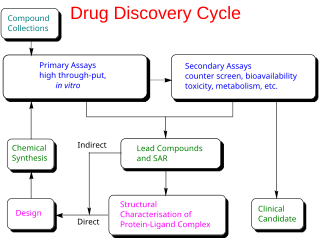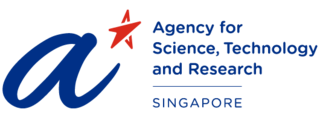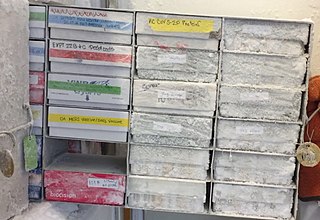
The Defense Advanced Research Projects Agency (DARPA) is a research and development agency of the United States Department of Defense responsible for the development of emerging technologies for use by the military.

The Bill & Melinda Gates Foundation (BMGF), a merging of the William H. Gates Foundation and the Gates Learning Foundation, is an American private foundation founded by Bill Gates and Melinda French Gates. Based in Seattle, Washington, it was launched in 2000 and is reported as of 2020 to be the second largest charitable foundation in the world, holding $49.8 billion in assets. The primary stated goals of the foundation are to enhance healthcare and reduce extreme poverty across the world, and to expand educational opportunities and access to information technology in the U.S. Key individuals of the foundation include Bill Gates, Melinda French Gates, Warren Buffett, chief executive officer Mark Suzman, and Michael Larson.
The DARPA Grand Challenge is a prize competition for American autonomous vehicles, funded by the Defense Advanced Research Projects Agency, the most prominent research organization of the United States Department of Defense. Congress has authorized DARPA to award cash prizes to further DARPA's mission to sponsor revolutionary, high-payoff research that bridges the gap between fundamental discoveries and military use. The initial DARPA Grand Challenge was created to spur the development of technologies needed to create the first fully autonomous ground vehicles capable of completing a substantial off-road course within a limited time. The third event, the DARPA Urban Challenge extended the initial Challenge to autonomous operation in a mock urban environment. The most recent Challenge, the 2012 DARPA Robotics Challenge, focused on autonomous emergency-maintenance robots.

The Wellcome Trust is a charitable foundation focused on health research based in London, in the United Kingdom. It was established in 1936 with legacies from the pharmaceutical magnate Henry Wellcome to fund research to improve human and animal health. The aim of the Trust is to "support science to solve the urgent health challenges facing everyone." It had a financial endowment of £29.1 billion in 2020, making it the fourth wealthiest charitable foundation in the world. In 2012, the Wellcome Trust was described by the Financial Times as the United Kingdom's largest provider of non-governmental funding for scientific research, and one of the largest providers in the world. According to their annual report, the Wellcome Trust spent GBP £1.1Bn on charitable activities across their 2019/2020 financial year. According to the OECD, the Wellcome Trust’s financing for 2019 development increased by 22% to US$327 million.
XPRIZE is a non-profit organization that designs and hosts public competitions intended to encourage technological development to benefit humanity. Their board of trustees include James Cameron, Larry Page, Arianna Huffington, and Ratan Tata among others.
Grand Challenges are difficult but important problems set by various institutions or professions to encourage solutions or advocate for the application of government or philanthropic funds especially in the most highly developed economies and
... energize not only the scientific and engineering community, but also students, journalists, the public, and their elected representatives, to develop a sense of the possibilities, an appreciation of the risks, and an urgent commitment to accelerate progress.

Drug development is the process of bringing a new pharmaceutical drug to the market once a lead compound has been identified through the process of drug discovery. It includes preclinical research on microorganisms and animals, filing for regulatory status, such as via the United States Food and Drug Administration for an investigational new drug to initiate clinical trials on humans, and may include the step of obtaining regulatory approval with a new drug application to market the drug. The entire process – from concept through preclinical testing in the laboratory to clinical trial development, including Phase I–III trials – to approved vaccine or drug typically takes more than a decade.

The Agency for Science, Technology and Research is a statutory board under the Ministry of Trade and Industry of Singapore.

Dr. Anita Goel, MD Ph.D is a Harvard-MIT-Stanford trained Physicist, Physician, and pioneering scientist and visionary in the emerging field of Nanobiophysics - a new science at the convergence of physics, nanotechnology, and biomedicine Harvard Frontiers of Science. At the Nanobiosym Research Institute (NBS) Nanobiosym R&D Institute Website, Dr. Goel examines the physics of one of the most fundamental processes of living systems: the way nanomotors read and write information into DNA. She and her team are commercializing these innovations to empower people with real-time precision data and insights about their health.
The White House BRAIN Initiative, is a collaborative, public-private research initiative announced by the Obama administration on April 2, 2013, with the goal of supporting the development and application of innovative technologies that can create a dynamic understanding of brain function.

CureVac N.V. is a German biopharmaceutical company that develops therapies based on messenger RNA (mRNA). Legally domiciled in the Netherlands and headquartered in Tübingen, Germany, the company was founded in 2000 by Ingmar Hoerr (CEO), Steve Pascolo (CSO), Florian von der Mulbe (COO), Günther Jung, and Hans-Georg Rammensee. CureVac had approximately 240 employees in November 2015 and 375 in May 2018.

Catalent, Inc. is a multinational corporation headquartered in Somerset, New Jersey. It is a global provider of delivery technologies, development, drug manufacturing, biologics, gene therapies and consumer health products. It employs more than 14,000 people, including approximately 2,400 scientists and technicians. In fiscal year 2020, it generated over $3 billion in annual revenue.
The Coalition for Epidemic Preparedness Innovations (CEPI) is a foundation that takes donations from public, private, philanthropic, and civil society organisations, to finance independent research projects to develop vaccines against emerging infectious diseases (EID).

An mRNAvaccine is a type of vaccine that uses a copy of a molecule called messenger RNA (mRNA) to produce an immune response. The vaccine delivers molecules of antigen-encoding mRNA into immune cells, which use the designed mRNA as a template to build foreign protein that would normally be produced by a pathogen or by a cancer cell. These protein molecules stimulate an adaptive immune response that teaches the body to identify and destroy the corresponding pathogen or cancer cells. The mRNA is delivered by a co-formulation of the RNA encapsulated in lipid nanoparticles that protect the RNA strands and help their absorption into the cells.

COVID-19 drug development is the research process to develop preventative therapeutic prescription drugs that would alleviate the severity of coronavirus disease 2019 (COVID-19). From early 2020 through 2021, several hundred drug companies, biotechnology firms, university research groups, and health organizations were developing therapeutic candidates for COVID-19 disease in various stages of preclinical or clinical research, with 419 potential COVID-19 drugs in clinical trials, as of April 2021.

The COVID-19 pandemic has affected many scientific and technical institutions globally, resulting in lower productivity in a number of fields and programs. However, the impact of the pandemic has led to the opening of several new research funding lines for government agencies around the world.

The Access to COVID-19 Tools Accelerator, or the Global Collaboration to Accelerate the Development, Production and Equitable Access to New COVID-19 diagnostics, therapeutics and vaccines, is a G20 initiative announced by pro-tem Chair Mohammed al-Jadaan on 24 April 2020. A call to action was published simultaneously by the World Health Organization (WHO) on 24 April.

As of 25 November 2021, 7.85 billion COVID-19 vaccine doses have been administered worldwide, with 53.9 percent of the global population having received at least one dose. While 29.06 million vaccines were then being administered daily, only 5.6 percent of people in low-income countries had received at least a first vaccine by October 2021, according to official reports from national health agencies, which is collated by Our World in Data.

COVID-19's caused virus, SARS-CoV-2, was isolated in late 2019. Its genetic sequence was published on 11 January 2020, triggering an urgent international response to prepare for an outbreak and hasten development of a preventive COVID-19 vaccine. Since 2020, vaccine development has been expedited via unprecedented collaboration in the multinational pharmaceutical industry and between governments. By June 2020, tens of billions of dollars were invested by corporations, governments, international health organizations, and university research groups to develop dozens of vaccine candidates and prepare for global vaccination programs to immunize against COVID‑19 infection. According to the Coalition for Epidemic Preparedness Innovations (CEPI), the geographic distribution of COVID‑19 vaccine development shows North American entities to have about 40% of the activity, compared to 30% in Asia and Australia, 26% in Europe, and a few projects in South America and Africa.

The CureVac COVID-19 vaccine was a COVID-19 vaccine candidate developed by CureVac N.V. and the Coalition for Epidemic Preparedness Innovations (CEPI). The vaccine showed inadequate results in its Phase III trials with only 47% efficacy.










